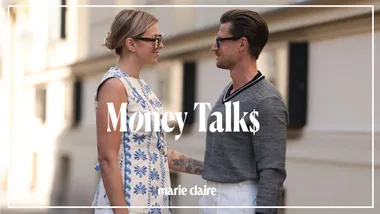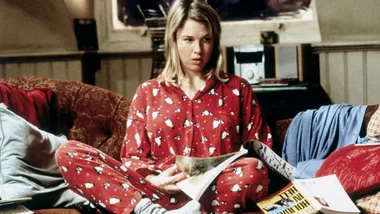Welcome to Money Talks, where everyday couples reveal how they navigate all things finance.
For most of us, deciding on a superannuation fund came with about as much thought as ordering a mid-week takeaway. But unlike tossing up between a pad Thai or an over-priced salad, the choices you make surrounding your super have long-term impacts.
In fact, the decision to sign onto a slew of supers when you were bouncing between jobs as a late teen could be holding you back from your future financial goals. This was the case for Sydney-based Gemma* who at 30 made the decision to pool her super together with her partner so that they could buy a property. Here we unpack the complexities of shared supers and investigate how to leverage them to your advantage.
The Couple Who… Share Super
Age: 36 and my partner just turned 40
Salary: Combined income of 200k plus
Profession: Marketer and Financial Adviser
Meet The Couple
marie claire: Do you have both a solo bank account, shared or both?
Gemma: “Our accounts are shared as we pool all our savings in a mortgage offset account.”
MC: What is your relationship like with money?
G: “I was raised by a single mum who tried her hardest to instill financial responsibility in me. Mum worked hard and managed her money well so that she could provide for us.
When I entered my 20s, I realised there was this whole world out there, and that I had the freedom to explore it. I travelled, I got credit cards, and did all sorts of silly things. I definitely wasn’t like some of my mates who focused on saving.
By the time I got to 30, I was was hit with the realisation that buying a property was going to be tough, especially when I hadn’t really put money aside for a deposit. That was the turning point of when I started thinking more about financial security, what that could look like, and the role that property plays in that.
I didn’t have a huge amount of financial literacy. Like a lot of older millennials, I had multiple superannuation floating all over the place. My partner is a financial adviser, so he was mortified to discover that I hadn’t consolidated all of my supers. It was a real it was a mess.”
“My partner is a financial adviser, so he was mortified to discover that I hadn’t consolidated all of my supers”
MC: How did you decide to combine your supers?
Gemma: I have been with my partner for nine years. We knew we didn’t want to get married, so about three years into our relationship we decided to join our supers. For me, that was more of a commitment than marriage. I’m literally tying my retirement to this guy. I was all in.
MC: What have been the benefits?
G: “The main reason we decided to combined our supers was to create a self-managed super fund, that we could then leverage to buy a property.
At the time, it felt we would never be able to afford a house in Sydney. So we decided to pull our supers into a SMSF and actually buy an investment property.
We can never live in that property, that’s a really clear guideline. It’s got to be a pure investment.”
MC: How do you and your partner broach the topic of money?
G: “You’ve got to be really comfortable with shared finances in other ways before jumping into this. A lot of my married friends still run separate bank accounts and get their salaries paid into separate accounts. People think very differently about joining finances so readily these days, and so they should.
You have to have so much trust and openness. When we started talking about combining our supers, we’d already combined our finances. So the jump from share incomes into a joint super fund wasn’t as big a decision as a couple who are managing their finances separately.
It’s important to consider: If you had to undo the decision how would you approach it and what would be the principles of how that’s going to be delineated and actually documenting that before you set it up.
Feeling like you understand each other’s financial principles is crucial. For us, money and financial security is important, but it’s also a means to an end. Money is for enjoying life and spending.
My partner was also raised by a single mum, so we both come from a similar background. We want that future security, but we also really want to enjoy life today. We’re not people who want to forego too much in favor of having all of this money stashed away for a rainy day.”
“I’m not saying it would be easy but having a paper trail mean that there couldn’t be any misunderstanding”
MC: What happens if you break up?
G: “My partner and I had a lot of conversations around how we would approach that. We’ve got some really clear documentation so that we have a clear distinction of what we both put in initially and tracking each of our contributions. I’m not saying it would be easy but having a paper trail mean that there couldn’t be any misunderstanding and we feel super comfortable with how we would approach it were that to happen.”
MC: What are the challenges of a self-managed super?
G: “It’s really important to understand the level of involvement that comes with a self-managed super fund. You’d have to have a really high financial literacy and a really clear understanding of the system. So for most people going down that path, it’s actually understanding you also need financial advisor to work with, or at least a really highly skilled accountant to like work with you on the process and the ongoing management.”
It’s definitely not a set and forget. There’s a lot of regulatory and reporting requirements that come with it each year.
You also need to have the right level of super to put in. There’s a minimum starting value, which was part of the benefit of going in with my partner as on my own I would have been way off half of the starting value.”

MC: What can you invest in with a self-managed fund?
G: “You can invest it in however you want. I actually have a friend who’s invested her super in pink diamonds.”
MC: How do you feel about your current financial situation?
G: “I feel extremely fortunate to own a part of a house (the bank still owns most of it!) and be able enjoy some travel – although we are planning to reduce this in the near future to support with more active savings. “
MC: What are your future finance goals?
G: “The next five years will be focused more on wealth consolidation, paying down our mortgage and contributing as much as possible into super.”
*Name has been changed.
Disclaimer: The contents of this article are personal recounts and not advice. They have been prepared without taking account of your objectives, financial situation or needs. You should, before you make any decision regarding any information, strategies or products mentioned on this website, consult your own financial advisor to consider whether that is appropriate having regard to your own objectives, financial situation and needs.









